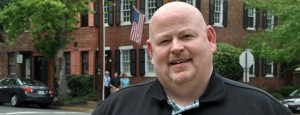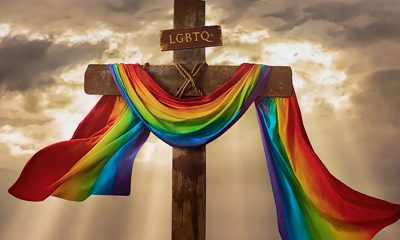Local
‘Reel’ debt delays festival
Acclaimed LGBT film event moved to April due to money woes

Larry Guillemette of One In Ten, the non-profit group that organizes Reel Affirmations, said fundraising challenges forced the event to be rescheduled to April 2011. (Washington Blade photo by Michael Key)
An inability to raise the money needed to hold D.C.’s annual LGBT film festival this October has spurred a decision to reschedule Reel Affirmations for spring 2011, according to organizers and sources familiar with the event.
The money problems also prompted organizers to reassess the time of year the event should be held, leading to a permanent rescheduling of the highly acclaimed event for late April and early May in succeeding years.
Larry Guillemette, marketing and sponsorship manager for One In Ten, the non-profit group that has organized Reel Affirmations each October for the past 19 years, acknowledged that a debt exceeding $40,000 from last year’s festival and a diminishing number of corporate sponsors and donors made it difficult to pull together the festival this year.
It had been scheduled to take place Oct. 14-23 in a number of prominent city theaters, including the Harmon Center for the Arts, the Goethe Institute and the E Street Cinema downtown, the Jewish Community Center near Dupont Circle and the AFI Theater in Silver Spring.
“As with a lot of non-profit organizations in our nation’s capital, gay or straight, we are faced with the same [monetary] challenges,” Guillemette said.
“What we found ourselves doing this year was going to various different organizations that we were hoping might sponsor us. And the economy being what it is, that kind of ability to support us wasn’t there,” he said.
Guillemete said One In Ten will screen three LGBT films this fall, including an award-winning film the group planned to announce soon. Beginning in November, One In Ten will resume a practice it previously discontinued: a monthly showing of an LGBT film in Washington at different theaters.
The group’s ability to hold the full festival in October was further hampered by last year’s resignation of Margaret Murray, who had served as One In Ten’s executive director since 2006, Guillemette said. He noted that it was Murray’s job to work on corporate and organizational sponsorships and other fundraising efforts for the 2010 festival beginning in the latter months of 2009.
“What that did for us on some levels is put us in a tiny bit of a period of flux and transition that we weren’t necessarily prepared for because that was the time of year that most festivals are putting together their proposals for funding for the following year,” he said.
Meanwhile, the group’s debt and general shortage of funds prevented the hiring of someone to replace Murray, who left to take a new job, he said.
At the time of Murray’s departure in November, Guillemette said, One In Ten had become nearly an all-volunteer organization, returning to its “roots” before its first executive director was hired in 2000.
Joe Bilancio, One In Ten’s programs manager and the person in charge of obtaining the films, is being compensated as a consultant, Guillemette said. Guillemette is serving as a volunteer and called his work on the festival “a labor of love.”
According to Guillemette, the funding problems were just one of several issues that prompted the One In Ten board to move the annual festival to the spring. He said other factors included competing LGBT events in October, such as the Human Rights Campaign’s annual national dinner and the Miss Adams Morgan drag pageant, a large event that attracts participants who might otherwise attend the film festival.
Guillemette said the problems associated with holding the festival this October led to long discussions on something the event’s organizers have contemplated for a number of years: the advantages of holding a film festival in the early months of the year.
Among other things, top-quality LGBT-related films made by independent filmmakers are usually released in the early part of the year and shown at other film festivals in the winter and spring, said Guillemette and Bilancio. The two noted that by the time One In Ten’s Reel Affirmations festival is held in the fall, some of the patrons of Reel Affirmations have already seen these films at other festivals.
In recent years, a number of films shown at Reel Affirmations and other LGBT film festivals also have been shown first on gay cable television networks, with others sometimes available through Netflix, said Guillemette and Bilancio.
“It’s significantly different than what it was when we started the festival in the early 1990s, when access to independent gay film was not that easy,” Guillemette said. “And we could count on a sold-out festival because there weren’t options like Neflix and Logo and Here TV and other things.”
Although moving the festival to the spring won’t counter the competing venues for gay film, Bilancio said holding Reel Affirmation in the early part of the year will at least ensure that it’s the first opportunity for most D.C. festival goers to see the films.
One source familiar with last year’s Reel Affirmations festival, who spoke with the Blade on condition of anonymity, said the One In Ten debt stemmed from a drop in revenue compared to previous festivals. Ticket sales were down as was advertising in the festival’s lengthy program booklet, the source said.
Instead of generating seed money for the 2010 festival, which was slated to celebrate Reel Affirmations’ 20th anniversary, the revenue shortfall resulted in debts to various vendors, including the graphic artist who helped produce the program booklet. At least $20,000 to $25,000 was needed to produce the booklet for this year, a sum the group apparently did not have, the source said.
Organizers were hopeful that a special town hall meeting that One In Ten held in April at the Human Rights Campaign headquarters would persuade people to make the donations that were needed to keep the event on track for October. But less than $5,000 was raised as a result of the town meeting, the source said, an amount far less than was needed to stage the festival in October.
Guillemette, who was not among the festival organizers last year, said still other factors were at play, including foul weather during several evenings of the October 2009 festival. He also noted that an earlier decision to discontinue the festival’s VIP membership program, which provided special benefits to large donors, made the festival more reliant on single ticket sales, which were down in 2009.
He said the board this year reinstated the VIP membership program and is taking other steps to better promote the spring festival.
“We’re not burying our head in the sand. We fully acknowledge there were things that needed to be changed in the way we did things,” he said. “And I think we brought back the right team to make those changes.”
Lisa King, One In Ten’s board president, declined to comment, deferring to Guillemette as the organization’s spokesperson. Murray could not be immediately reached for comment.
District of Columbia
Two charged with assaulting, robbing gay man at D.C. CVS store
Incident occurred after suspects, victim ‘exchanged words’ at bar

D.C. police just after 1 a.m. on April 10 arrested two men for allegedly assaulting and robbing a gay man inside a CVS store at 1418 P St., N.W., according to a police report and charging documents filed in D.C. Superior Court.
The charging documents state that the alleged assault and robbery occurred a short time after the three men “exchanged words” at the gay bar Number 9, which is located across the street from the CVS.
The arrested men are identified in the charging documents as Marquel Jose Diaz, 27, of Northwest D.C., and Lorenzo Jesse Scafidi, 21, of Elizabeth City, N.C. An affidavit in support of the arrest for Diaz says Diaz and the victim “were previously in a relationship for a year.”
Court records show Diaz was charged with Simple Assault, Theft Second Degree, and Possession of a Controlled Substance. The court records show the controlled substance charge was filed by police after Diaz was found to be in possession of a powdered substance that tested positive for cocaine.
Scafidi was charged with Simple Assault and Theft Second Degree, the court records show.
The D.C. police report for the incident does not list it as a suspected hate crime.
The court records show both men pleaded not guilty to the charges against them at a Superior Court arraignment on the day of their arrest on April 10. The records show they were released by a judge while awaiting trial with an order that they “stay away” from the victim. They are scheduled to return to court for a status hearing on May 21.
The separate police-filed affidavits in support of the arrests of both Diaz and Scafidi each state that the two men and the victim “exchanged words” inside the Number 9 bar. The two documents state that both men then entered the CVS store after the victim went to the store a short time earlier.
Scafidi “came into the CVS shortly after and entered the candy aisle and slammed Complainant 1 [the victim] to the ground causing Complainant 1’s phone to fall out of CP-1’s pocket,” one of the two affidavits says. It says Scafidi “again picked up CP-1 and slammed him to the ground.”
The affidavit in support of Diaz’s arrest says Diaz also followed the victim to the CVS store after words were exchanged at the bar. It says that after Scafidi allegedly knocked the victim down in the candy aisle Diaz picked up the victim’s phone, “swung on” the victim “while he was still on the ground,” and picked up the victim’s watch before he and Scafidi fled the scene.
Without saying why, the two arrest affidavits say Diaz and Scafidi returned to the scene and were arrested by police after the victim and at least one witness identified them as having assaulted and robbed the victim.
Attorneys representing the two arrested men did not respond to phone messages from the Washington Blade seeking comment and asking whether their clients dispute the allegations against them.
The victim also did not respond to attempts by the Blade to obtain a comment from him. The police report says the victim is a resident of Fairfax, Va.
District of Columbia
Bowser calls for ‘extraordinary’ response to reduction in D.C. budget
Impact on city funding for LGBTQ programs and grants unclear

D.C. Mayor Muriel Bowser on April 15 issued an executive order calling for “extraordinary actions,” including “significant cuts in District Government services,” to address a decision by Congress to cut the city’s current budget by $1.1 billion.
The nine-page executive order points out that these actions became necessary after the U.S. House of Representatives has so far declined to vote on a free-standing bill approved by the U.S. Senate last month that would restore the $1.1 billion D.C. budget cut initially approved by the House.
In addition to large-scale cuts in city services, the mayoral order says the congressionally imposed city budget cut will bring about city “hiring freezes, financial impacts to employees, reductions and terminations in contracts and grants, and closures of District Government facilities.”
The order adds, “These are unprecedented actions given that the District itself adopted and is able to implement a fully balanced budget, but they are necessary due to the Congressional cut to the District’s budget and its inaction in timely fixing its legislative error.”
The House adjourned this week on a recess until the end of April, and congressional observers say it is unclear whether the majority Republican House will take up the Senate bill to undo the D.C. budget cut when the House returns from its recess. President Donald Trump has called on the House to approve the bill to restore the full D.C. budget.
Among the D.C. LGBTQ organizations and those providing services to the LGBTQ community that receive D.C. government funding and that could be impacted by the budget cuts are Capital Pride Alliance, which is organizing WorldPride 2025 set to take place in D.C. next month; and Whitman-Walker Health, one of the city’s largest private healthcare organizations that provides medical services for LGBTQ clients.
Also receiving city funding are the Wanda Alston Foundation, which provides housing services for LGBTQ people; and the LGBTQ youth advocacy and services organization SMYAL.
Spokespersons for the four organizations couldn’t immediately be reached to determine if they knew whether the soon-to-be implemented budget cuts would have an impact on the city funding they currently receive.
In response to questions from news reporters during an April 15 press conference call to discuss the Bowser executive order, Jenny Reed, director of the D.C. Office of Budget and Performance Management, said details on specific programs or funding allocations set to be cut would not be known until the mayor submits to the D.C. Council her Supplemental FY 2025 budget along with her proposed FY 2026 budget.
Reed was joined at the press briefing by Lindsey Parker, Mayor Bowser’s chief of staff; and Tomas Talamante, director of the Office of Intergovernmental Affairs.
They and other city officials have said the impact of the congressionally imposed city budget cut was expected to be lessened but remain highly problematic by Bowser’s decision to invoke a 2009 law that allows the city to increase its own spending without approval by Congress under certain circumstances.
The mayor has said under that law, the city would need to cut its FY 2025 budget by $410 million rather than by $1.1 billion. It couldn’t immediately be determined whether House Republicans, who initiated the requirement that the D.C. budget be cut by $1.1 billion, would challenge the mayor’s plan to invoke the 2009 law to reduce the size of the budget cut.
“Without the ability to fully execute the Fiscal Year 2025 budget as adopted and approved by the District, this gap will force reductions in critical services provided by our largest agencies, including the Metropolitan Police Department and the Fire and Emergency Medical Services Department,” the mayor’s executive order states.
“The District will continue to work with members of the House of Representatives to urge them to vote to fully restore the District’s Fiscal year 2025 budget and will continue to work with President Trump to strongly encourage the House of Representatives to take that action,” the order says.
District of Columbia
LGBTQ budget advocates fight for D.C. resources in a tough fiscal year
‘Trying to preserve life-saving services’ amid $1 billion cut

The months and days leading up to June are especially busy for LGBTQ Washingtonians. For one group, the DC LGBT Budget Coalition, which works year-round to ensure LGBTQ residents are represented and financially supported by the D.C. government, this time of year is their Super Bowl. Beginning in April, the D.C. Council and Mayor’s Office hold budget hearings for the next fiscal year.
With D.C.’s budget now under review, the Washington Blade spoke with Heidi Ellis, coordinator of the DC LGBT Budget Coalition, about the group’s top priorities and their push to ensure continued support for queer communities.
“The LGBTQ Budget Coalition was founded in 2020 at the height of the pandemic, as a way for the community to work together to advocate for key funding and policy changes,” Ellis said. “We recognized we were stronger together. A lot of groups are often pitted against each other for resources and dollars. This coalition was founded out of a need for unity. Since then, we’ve successfully advocated for more than $20 million in dedicated LGBTQ investments.”
In addition to coordinating the coalition, Ellis is the founder and CEO of HME Consulting & Advocacy, a firm that helps build coalitions and advance policy initiatives that address intersectional issues in the LGBTQ community. One of its most powerful tools, she explained, is direct outreach through community surveys.
“We actually do community surveys to see what people need and what’s top of mind,” Ellis said. “Of course, we also pay attention to the broader political landscape — like the current threats to HIV funding. That helps us prioritize.”
Because the coalition is comprised of more than 20 organizations across various sectors —healthcare, housing, community organizing — Ellis said its diversity enables it to connect grassroots needs to potential policy solutions.
“Our coalition includes service providers, community groups, health and housing advocates-folks who are deeply plugged into what’s happening on the ground,” she said. “They help determine our direction. We know we don’t represent every queer person in D.C., but our coalition reflects a wide range of identities and experiences.”
The insights gathered through those surveys ultimately inform the coalition’s annual budget proposal, which is submitted to the Council and mayor.
“That’s how we got to our FY26 priorities,” she said. “This year, more than ever, we’re fighting to protect what we’ve already secured — funding and policies we’ve had to fight for in the past. We know there’s concern around this budget.”
One of the challenges this year is that the D.C. government’s operating budget and some of its legislation must be approved by Congress. With a projected decline in tax revenue and a Republican-controlled Congress that has historically opposed LGBTQ funding, the Coalition has had to think strategically.
“Even before the situation on the Hill, the CFO projected lower revenue,” Ellis said. “That meant cuts to social programs were already coming. And now, with the $1 billion slashed from D.C.’s budget due to the continuing resolution, we’re not only fighting for D.C.’s budget and autonomy, but also trying to preserve life-saving services. Our message is simple: Don’t forget about queer people.”
This year’s proposal doesn’t include specific dollar figures. Instead, the Coalition outlines five funding priority areas: Healthcare, Employment & Economic Equity, Housing, Safety & Community Support, and Civil Rights.
Why no exact amounts? Ellis said it’s because not all solutions are financial.
“Some of our asks don’t require new funding. Others build on existing programs-we’re asking whether the current use of funds is the most effective. We’re also proposing policy changes that wouldn’t cost extra but could make a real difference. It’s about using what we have better,” she said.
When drafting the proposal, the Coalition tries to prioritize those with the most pressing and intersecting needs.
“Our perspective is: If we advocate for the most vulnerable, others benefit too,” Ellis said. “Take LGBTQ seniors. Some may have done well in life but now face housing insecurity or struggle to access affordable healthcare. Many in our coalition are elders who fought on the frontlines during the AIDS epidemic. They bring critical historical context and remind us that Black and brown communities bore the brunt of that crisis.”
“I love our coalition because it keeps us accountable to the moment,” she added. “If we center those most marginalized, we can make an impact that lifts everyone.”
In addition to healthcare and housing, safety remains a top concern. The Coalition has fought to maintain funding for the Violence Prevention and Response Team (VPART), a city-supported group that includes MPD, community-based organizations, and the Mayor’s Office of LGBTQ Affairs. VPART responds to crimes affecting the LGBTQ community and connects victims to legal, healthcare, and housing services.
“We’ve pushed to make VPART more proactive, not just reactive,” Ellis said. “The funding we’ve secured has helped survivors get the support they need. Cutting that funding now would undo progress we’re just beginning to see.”
At the end of the day, Ellis emphasized that this process is about far more than spreadsheets.
“A budget is a moral document,” she said. “If we’re not represented, you’re telling us our lives don’t matter at a time when we need protection the most. When people can’t get food, medicine, housing — that has a devastating impact. These are vital services.”
The DC LGBT Budget Coalition is urging residents to support a letter-writing campaign to D.C. Council members and the mayor. You can send a letter here: https://actionnetwork.org/letters/fully-fund-dcs-lgbtq-communities
Read the full FY26 budget proposal here: https://drive.google.com/file/d/1bTrENnc4ZazJTO6LPrQ3lZkF02QNIIf1/view
-

 District of Columbia2 days ago
District of Columbia2 days agoReenactment of 1965 gay rights protest at White House set for April 17
-

 Maryland3 days ago
Maryland3 days agoFreeState Justice: Transgender activist ‘hijacked’ Moore’s Transgender Day of Visibility event
-

 Hungary3 days ago
Hungary3 days agoHungarian MPs amend constitution to ban public LGBTQ events
-

 Real Estate3 days ago
Real Estate3 days agoNavigating DMV real estate market during political unrest












